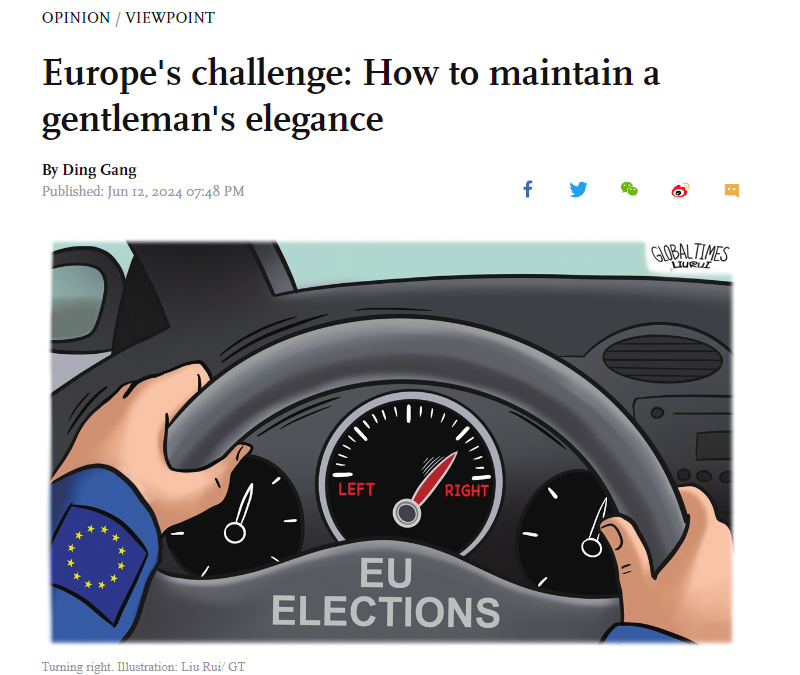LATEST INSIGHTS
Your Present Location: LATEST INSIGHTSDing Gang: Europe's challenge: How to maintain a gentleman's elegance
Source: GT Published: 2024-06-12

In the European Parliament elections that concluded on Sunday, far-right parties in major countries such as France, Germany and Italy performed strongly and gained significant seats.
European politics has always been divided into left, center and right. Far-right parties are not a new phenomenon but a long-standing component of the European political landscape. Now, the rise of the far-right is a sign of rising anti-immigrant sentiment across European society.
During conversations with Chinese friends living in Europe, it was revealed that their biggest concern was that Europe's anti-immigration tendency would continue to intensify.
When I worked in Europe more than 30 years ago, I had already felt the rise of right-wing forces. In the 1980s, far-right parties such as the National Front in France and the Freedom Party of Austria were on the rise.
When I worked in Brussels in the 1990s, there were over 100 Catholic churches and some 20 mosques in the European capital. In 2015, refugees from North Africa flooded into Belgium. The Pew Research Center estimates that Muslims made up 7.6 percent of Belgium's total population in 2016, which was about 870,000 people. Now, the number of mosques in Belgium have reached about 300 nationwide.
My friend Franz once expressed his concern, saying 'Discrimination is getting worse, and the Muslim immigrants are having a hard time finding jobs.' He told me that more and more young Belgians were choosing to support the right wing, attracted by their anti-immigration agenda.
Franz's discussion on immigrant integration focused more on cultural integration. It is not only about giving immigrants more relaxed residency rights or more subsidies but also about how to recognize the status of immigrant culture and truly integrate immigrants into society.
Prominent political expert Francis Fukuyama conveyed a similar perspective in his 2006 piece 'Identity, Immigration, and Liberal Democracy': 'National identities in Europe, compared to those in the Americas, remain far more blood-and-soil based, accessible only to those ethnic groups who initially populated the country… most [European countries] tend to conceive of multiculturalism… as a framework for the coexistence of separate cultures rather than a transitional mechanism for integrating newcomers into the dominant culture. Many Europeans express skepticism about whether Muslim immigrants want to integrate, yet those who do are not always eagerly welcomed, even if they have acquired the language and basic cultural knowledge of the dominant society.'
When thinking of Europeans, there was a time when people conjured up an image of elegantly dressed gentlemen and ladies with refined manners. However, this elegance is currently facing an unprecedented crisis because of immigrant issues.
As economic growth weakens and political infighting intensifies, Europe has encountered the most significant wave of refugees since World War II. Thousands of foreign faces have flooded the streets of Europe, with intense clashes of diverse cultures, widening wealth gaps, and the constant shadow of terrorist attacks. The once elegant demeanor has gradually been replaced by anxiety, unease and rejection.
Many Europeans feel that their established identity is being eroded and traditional values are being challenged. Thus, anti-immigration becomes the first line of defense in responding to this anxiety and a simple way to protect the 'European fortress.'
This xenophobic sentiment is more rooted in cultural anxiety in the context of globalization. Anti-immigration aims to protect Europe's core values more forcefully. Therefore, Europeans are not only unlikely to change their traditional values, but are also unlikely to realize the need to strengthen unity based on shared values and revitalize the expansionary power of European civilization to the world. The fight to defend their values will continue on a global level.
However, the elegance of European gentlemen is not attained through conservatism, isolationism, or hostility toward immigrants. The elegance of Europe should encompass diligent work, a fearless attitude toward competition, and a spirit of openness and progress.
In the broader context of globalization, the integration and collision between Western civilization and other civilizations are entering a more complex stage, which is reflected in the dramatic changes in the geopolitical map of this century.























































































 京公网安备 11010802037854号
京公网安备 11010802037854号





